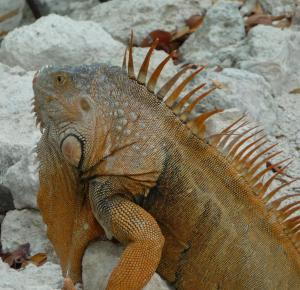Is an Iguana a Good Pet For You?
- posted: Aug. 21, 2016
Do Iguanas Make Good Pets?
 While reptiles are not my forte, Doctors Doug and Kevin Schmidt and Dr. Spencer at Patton Veterinary Hospital do see reptiles and other exotic pets. One of the most common reptiles kept as pets is the green iguana. Iguanas are found naturally in subtropical areas such as Mexico, South America, Cuba, Puerto Rico, Jamaica and many of the Caribbean islands. As I found out on my recent trip to the Florida Keys, iguanas are a non-native species that were introduced to the state and can be somewhat of a nuisance. They were not native to Florida, but, many people released unwanted pet iguanas into the wild, and those that survived are breeding and becoming an invasive species.
While reptiles are not my forte, Doctors Doug and Kevin Schmidt and Dr. Spencer at Patton Veterinary Hospital do see reptiles and other exotic pets. One of the most common reptiles kept as pets is the green iguana. Iguanas are found naturally in subtropical areas such as Mexico, South America, Cuba, Puerto Rico, Jamaica and many of the Caribbean islands. As I found out on my recent trip to the Florida Keys, iguanas are a non-native species that were introduced to the state and can be somewhat of a nuisance. They were not native to Florida, but, many people released unwanted pet iguanas into the wild, and those that survived are breeding and becoming an invasive species.
Despite causing some problems in south Florida, iguanas can make good pets. However, please consider the special care, needs and lifespan of these large reptiles before purchasing one. Iguanas should never be purchased on impulse. Baby iguanas are small and cute, but they have a lifespan of 15-20 years and can grow to be nearly six feet in length. They require large enclosures, specialized heating lamps and they eat a lot of different greens and require calcium supplements for good health.
Baby iguanas may be housed in a 20 gallon aquarium, but, as they mature, adult iguanas need much larger cages. The recommended size is 12 x 6 x 6 feet. They also need a warm, humid environment. Heating pads or hot rocks are not recommended as pet iguanas may burn themselves. Heat and light sources should be above the iguana. Iguanas also appreciate hibiscus plants or other branches to climb on. They eat a variety of greens and vegetables such as dandelions, yellow squash, collard greens and green beans and some fruits. Be careful not to overdo the fruit as iguanas may develop diarrhea. There are also good commercial diets available to feed your iguana. And remember, calcium is necessary to prevent metabolic bone disease.
Metabolic bone disease is one of the more common ailments seen in pet iguanas. Lack of adequate calcium causes the bones to soften and may lead to difficulty moving and even broken bones. Iguanas may also develop an infection of the mouth known as mouth rot and may contract internal parasites (worms) as well as external parasites like mites.
So, while iguanas are interesting and intelligent, friendly pets, they are not for everyone. Before choosing an iguana or any other exotic animal as a pet, please make sure you have the space, time and money to properly care for this type of pet for the lifespan of the animal. Too many exotic pets end up dying, going to rescues or shelters or, even worse, being thrown away by being released into environments where they may not be able to survive but where they may also pose a threat to native species of animals and plants. Exotic pets typically require a long commitment and a lot of care. Think carefully before committing to an iguana or other exotic. If you have the space and the right attitude, iguanas can make fun, long term companions.
This blog brought to you by the Patton Veterinary Hospital serving Red Lion, York and the surrounding communities.
Information from http://www.reptilesmagazine.com/Care-Sheets/Lizards/Green-Iguana/ The Green Iguana Care Sheet by Tom Crutchfield, Reptiles Magazine.
Location
Patton Veterinary Hospital
425 E Broadway
Red Lion, PA 17356
